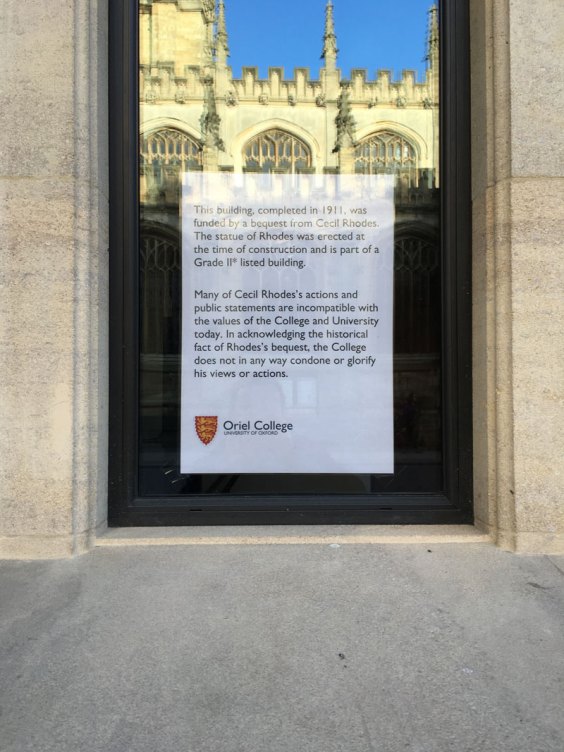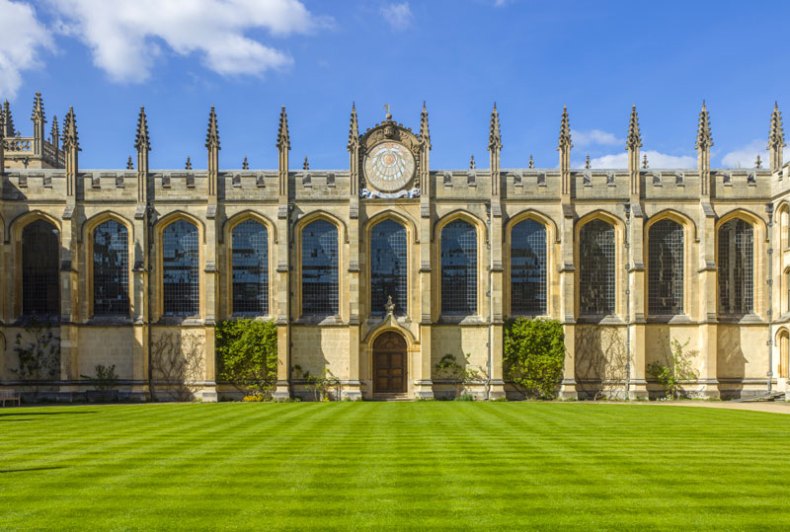Cecil Rhodes was an unpleasant person and his activities were among the most distasteful in the history of the British Empire. But he existed, was historically significant, and his possibly ill-gotten gains were posthumously put to good use – as he wished – and no less than Nelson Mandela was happy to combine with the Rhodes Trust in Oxford to establish Mandela Rhodes Scholarships for African students. That the Provost of Oriel College should seriously consider the puerile, posturing protest against the statue of Rhodes on the building (by that excellent architect Basil Champneys) his money paid for suggests that academic attitudes in modern Oxford are rather more narrow and feeble than those of the great South African black hero.
Of course there are occasions when the removal of a statue can be justified, as when the subject was an imperialist oppressor. It is scarcely surprising that, after the fall of Soviet Communism, the peoples of Eastern Europe soon removed all those images of Lenin and Stalin. And in India after independence conspicuous statues of Viceroys and Kings-Emperor were soon removed – though it is worth noting that, in Delhi for instance, they have been preserved in the new Coronation Park while many survive in situ.

In response to a student campaign to have a statue of Cecil Rhodes removed, Oriel College has put up a notice ‘clarifying its historical context and the college’s position on Rhodes’.
But this is not the case with Rhodes. And if the man was so wicked that the sight of him can no longer be tolerated, why stop at removing his statue? The money that paid for the building should be given away, and perhaps the building itself should be demolished – along with Sir Herbert Baker’s masterpiece, Rhodes House? One professor of history has entertainingly suggested that, as Southern Rhodesia has been renamed Zimbabwe, the logical thing to do now is to replace the statue of Rhodes by that black paragon of virtue Robert Mugabe. That, at least, would demonstrate the blinkered childishness of protesting against a statue. As for the plaque on the Oriel-owned building in which the undergraduate Rhodes once lived, that merely records an historical fact – as do the Blue Plaques placed on London houses. Some of those so honoured might also now seem bad people – like Sir Hiram Maxim, inventor of the machine gun. Should the Blue Plaque now be chiselled off the front of the house which the inventor once occupied?

Christopher Codrington, who endowed the eponymous library at All Souls’ College, made his money from West Indian plantations and slavery. Photo: Wikimedia Commons
Attitudes change, fortunately, but that earlier generations had opinions and did things we now find offensive cannot be airbrushed away. They are part of history, to acknowledge and, hopefully, learn from. Oxford and Cambridge colleges have long benefitted from endowments derived from loathsome activities. As has often been pointed out, Christopher Codrington, who endowed the eponymous library at All Souls’ College, made his money from West Indian plantations and slavery. Should his statue, by Henry Cheere – a serious work of art – be removed from that magnificent and useful building designed by Nicholas Hawksmoor? And Oxford, like other universities, still seems happy today to accept tainted money to build new institutions and college buildings. R.W. Johnson has compared the demand to eliminate the statue of Rhodes at Oriel with the vandalism at Palmyra carried out by IS/Daesh. The comparison may be extreme, but there is justice in it. There is the same bigotry and dogmatism, the same desire to rewrite history on ideological grounds. In the cause of truth and historical veracity as well as of the value of art and aesthetics, Oriel College should treat these fatuous and blinkered protests with contempt.

Protesting against a historical statue is not just childish – it’s bigoted, too
Share
Cecil Rhodes was an unpleasant person and his activities were among the most distasteful in the history of the British Empire. But he existed, was historically significant, and his possibly ill-gotten gains were posthumously put to good use – as he wished – and no less than Nelson Mandela was happy to combine with the Rhodes Trust in Oxford to establish Mandela Rhodes Scholarships for African students. That the Provost of Oriel College should seriously consider the puerile, posturing protest against the statue of Rhodes on the building (by that excellent architect Basil Champneys) his money paid for suggests that academic attitudes in modern Oxford are rather more narrow and feeble than those of the great South African black hero.
Of course there are occasions when the removal of a statue can be justified, as when the subject was an imperialist oppressor. It is scarcely surprising that, after the fall of Soviet Communism, the peoples of Eastern Europe soon removed all those images of Lenin and Stalin. And in India after independence conspicuous statues of Viceroys and Kings-Emperor were soon removed – though it is worth noting that, in Delhi for instance, they have been preserved in the new Coronation Park while many survive in situ.
In response to a student campaign to have a statue of Cecil Rhodes removed, Oriel College has put up a notice ‘clarifying its historical context and the college’s position on Rhodes’.
But this is not the case with Rhodes. And if the man was so wicked that the sight of him can no longer be tolerated, why stop at removing his statue? The money that paid for the building should be given away, and perhaps the building itself should be demolished – along with Sir Herbert Baker’s masterpiece, Rhodes House? One professor of history has entertainingly suggested that, as Southern Rhodesia has been renamed Zimbabwe, the logical thing to do now is to replace the statue of Rhodes by that black paragon of virtue Robert Mugabe. That, at least, would demonstrate the blinkered childishness of protesting against a statue. As for the plaque on the Oriel-owned building in which the undergraduate Rhodes once lived, that merely records an historical fact – as do the Blue Plaques placed on London houses. Some of those so honoured might also now seem bad people – like Sir Hiram Maxim, inventor of the machine gun. Should the Blue Plaque now be chiselled off the front of the house which the inventor once occupied?
Christopher Codrington, who endowed the eponymous library at All Souls’ College, made his money from West Indian plantations and slavery. Photo: Wikimedia Commons
Attitudes change, fortunately, but that earlier generations had opinions and did things we now find offensive cannot be airbrushed away. They are part of history, to acknowledge and, hopefully, learn from. Oxford and Cambridge colleges have long benefitted from endowments derived from loathsome activities. As has often been pointed out, Christopher Codrington, who endowed the eponymous library at All Souls’ College, made his money from West Indian plantations and slavery. Should his statue, by Henry Cheere – a serious work of art – be removed from that magnificent and useful building designed by Nicholas Hawksmoor? And Oxford, like other universities, still seems happy today to accept tainted money to build new institutions and college buildings. R.W. Johnson has compared the demand to eliminate the statue of Rhodes at Oriel with the vandalism at Palmyra carried out by IS/Daesh. The comparison may be extreme, but there is justice in it. There is the same bigotry and dogmatism, the same desire to rewrite history on ideological grounds. In the cause of truth and historical veracity as well as of the value of art and aesthetics, Oriel College should treat these fatuous and blinkered protests with contempt.
Unlimited access from just $16 every 3 months
Subscribe to get unlimited and exclusive access to the top art stories, interviews and exhibition reviews.
Share
Recommended for you
Kapoor’s moral right to keep hateful graffiti in place: a legal perspective
A look at the legal issues underpinning the story of Anish Kapoor’s vandalised ‘Dirty Corner’
Bulgaria must not try to forget its past
Sofia has many important monuments – and they should not be removed or destroyed
Kara Walker’s wild fantasies address the difficult reality of racism today
This hellish and farcical show at Victoria Miro is not to be missed